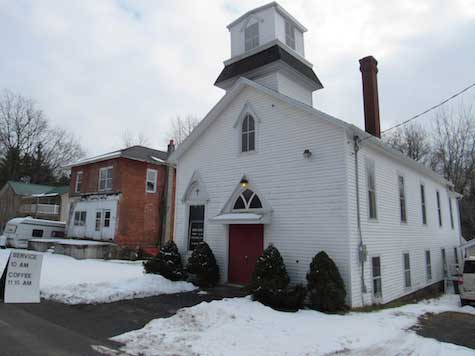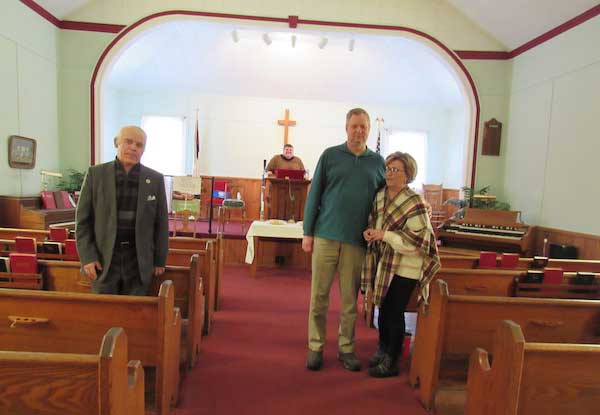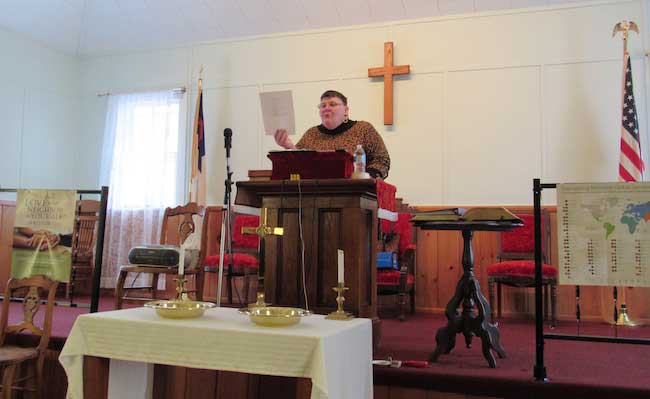Small congregation at Jeddo keeps the faith
3 steady attendees are committed to keeping open a church that dates back nearly two centuries

The Jeddo Chapel on Ridge Road has a sign out front inviting people to service and coffee hour, but rarely are there more than three there.
MEDINA – A tiny church in Jeddo has been part of the Jeddo community for 183 years, and although it struggles, devoted followers are determined to keep it going.
Officially called the Jeddo Community Chapel, the church is simply known as “Jeddo Chapel,” and while it once was a thriving congregation and hub of the community, it now opens its doors every Sunday to a congregation of three – maybe 10 on a special day.
Peggy Wright of Medina, who started attending the church in 1998, has been preaching the sermon for the past several years.
Attendees on a recent Sunday were Rob Johnson of County Line Road, Chris Craft who lives across the road, and Terry Mahnke of West Shelby Road. All three have families who formerly attended the church, and it is in their memories the three attend now.
Johnson started attending the church after moving back to the area five years ago. His great-great-grandfather Truman Johnson used to attend and was superintendent of the Sunday School for 50 years.
“He used to come to church on his sleigh, picking up kids along the way,” Johnson said.
Craft’s father was a Mason, and in November it will be 100 years since the family moved from Barker to their home across the street, where they started attending the Jeddo Chapel. The Masons played a big part in the history of the church, at one time giving them their lodge. Craft still lives across the street, and even though he also belongs to St. John’s Episcopal Church in Medina, Craft volunteers to turn the heat on each Sunday at Jeddo Chapel.

Three people who regularly attend the Jeddo Chapel are, from left, Chris Craft, who lives across the road; Rob Johnson of County Line Road; and Terry Mahnke of West Shelby Road. The families of all three attended the church in the past.
Mahnke’s mother used to attend the Jeddo church. Mahnke started coming because she had become acquainted with Wright when her daughter Hannah attended Wright’s pre-school.
“Hannah encouraged me,” Mahnke said. “She would come home from pre-school and ask me why we didn’t go to church.”
Wright said she began attending the church after her family became dissatisfied with the pastor of their former church.
“We were looking for a church, and as we had lived on County Line Road, we knew a lot of people who attended the Jeddo Chapel,” Wright said. “And their beliefs fell in line with mine.”
The pastor at that time was away a lot and asked Wright to fill in for him. The parishioners liked the way she preached, even though she has no official training.
The Rev. Richard Heitzenrater eventually took over, and when he left it was voted in April 2011 to close the church, as so many members were no longer attending.
The Rev. David Horner, however, who lived down the street, was married to the former Emily Bird, whose parents were faithful supporters of the church. The Rev. Horner had promised Emily’s father Horace he would make sure the Chapel never closed its doors.
“As I had been filling in on and off, Pastor Horner asked if I would be willing to assume the position of preacher,” Wright said.
Even though he has moved out of state, the Rev. Horner still supports the church.
Another parishioner, Duane Swann, offered to be organist, and for a while they had a handful of followers, which included Craft and the late MaryAnn Davis.
Wright and her small congregation are hoping to spur a revival, but they know it won’t be the first. In a record of its history, the church has undergone several revivals.

After a recent Sunday service, those in attendance had lunch in the small dining room. Clockwise from left are Rob Johnson, pastor Peg Wright, Chris Craft and guest Allan Kropf.
The earliest recollections of religious meetings in Jeddo are in 1837, when a Sunday School was organized in the Jeddo School House and the pastor of Johnson Creek Baptist Church began holding evening meetings in the school house. These continued until the people of the community felt a better place should be provided for worship.
The building was originally owned by the Good Templars Lodge, who offered it to the Johnson Creek Baptist Church, if they do the work to make the building suitable for the Lodge to meet. In the spring of 1887, work was begun and everyone in the community turned out to help dig out the basement and make a more substantial foundation for the building.
Farmers brought their teams and wagons and drew the stones that made the wall for the church. The stones came from an old abandoned Free Will Baptist Church which stood on Fruit Avenue, on the farm later owned by Paul Blackburn. The land on which the Johnson Creek Baptist Church stood had been purchased by the Good Templars from Josiah Payne, who lived next door. The Templars then deeded it to the Johnson Creek Baptist Church.
The Good Templars were given a lease of 99 years on the hall and could use it when it was not in use by the church.
Also about this time, the Jeddo Chapel Society was formed. The ladies agreed to pay all of the church expenses, including repairs, janitor, fuel and lights. They did so until the early 1950s.
In 1888, Mrs. William Bird’s sister Nellie Clark started a Young People’s Society of Christian Endeavor, which continued for 50 years. The women helped paper the chapel and bought the first carpet. When the time came for seats, Almer J. Brown donated red oak logs from his farm, which became the Bird farm. Will Bird was working for Brown at the time and drew the logs to Middleport to be sawed. He brought the lumber back to John Singleton’s wagon shop, the brick building next door, which later was Brewer’s Store.
‘Although our numbers have gradually decreased, we still feel the Lord wants us to continue worshiping him at this locality. Once again, we are praying for a revival that will reach our neighbors and beyond, and we will once again see the pews in this beloved church filled.’ – Peggy Wright, preacher at Jeddo Chapel
Gus Smith, who lived across the street where the Crafts now live, made the black walnut book racks now in use and put them on the pews. The organ is the one that was brought from the Sunday School which met in the Jeddo School House. In 1895, Mrs. Truman Johnson became organist, and then pianist. She continued for more than 50 years. (Rob Johnson explained that every generation of his family had a Truman, and he has a brother Truman today).
It was a long time before the church had a bell. For years the Good Templars and the Christian Endeavor Society had socials to raise money for the Bell Fund. It was eventually purchased with an additional gift from Josiah Payne.
The history of the church was compiled by William Bird’s wife Sarah.
“This chapel means so much to me, for I have been interested in it for 70 years,” she wrote in 1957. “How well I remember 70 years ago when it was dedicated,” she said. “I trust the future generations will take the interest, not only in keeping the building in repairs, but also assisting in the church services.”
Wright said the Jeddo Chapel continued to grow many years after as the community’s residents sacrificed, labored and gave their all. She said the community’s heart was in Jeddo Chapel and a need was soon evident for expansion. As in the past, Josiah Payne came to their rescue, and in February 1923 he deeded the land under the present kitchen to the Chapel. No one remembers who built the kitchen, Wright said, but the fact remains that the cooperative efforts of the Jeddo community made it possible.
In the spring of 1954, the Chapel was almost sold again and its doors closed, as was the school house. However, people worked and sacrificed as before, Wright said. An organ was purchased in 1959 and paid for in full in 1960. Carpet was installed, a furnace was put in and many more activities prevailed. Although enthusiasm continued and people gave their best, the Jeddo Chapel was once again instructed to close its books on April 22, 1961 and seek a more efficient means of existence within the Hartland Baptist structure.
The church bell may have been stilled, but in the hearts of Jeddo residents, the spirit had not died. For in the summer of 1974, a handful of Christian pioneers reorganized the Chapel’s Sunday School. By winter of 1974-75, worship had resumed with 15 charter members and incorporation as a full recognized American Baptist Church. They were received into membership of the American Baptist Churches of the Niagara Frontier on Feb. 8, 1975.
Wright said she is happy to lead worship at the tiny church. She researches her sermon each week and prints a weekly program. She said she spends some time every day working on something for the church. They have no organist or pianist any more, but Wright bravely leads the few in singing the hymns.
She takes no regular salary, and she said expenses are paid out of the collections taken each week. If there is anything left over after the bills are paid, that is her salary.
“Although our numbers have gradually decreased, we still feel the Lord wants us to continue worshiping him at this locality,” Wright said. “Once again, we are praying for a revival that will reach our neighbors and beyond, and we will once again see the pews in this beloved church filled.
The members are contemplating having a dinner at the church in the near future, in hopes the public will come and develop an interest in their congregation.
Worship is at 10 a.m. Sunday, and the church would welcome any visitors.










































































